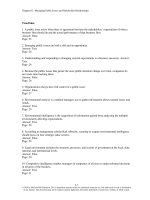Lecture Business and society: Stakeholders, ethics, public policy (14/e): Chapter 9 - Anne Lawrence, James Weber
Bạn đang xem bản rút gọn của tài liệu. Xem và tải ngay bản đầy đủ của tài liệu tại đây (1.11 MB, 18 trang )
chapter 9
Influencing the Political
Environment
McGrawHill/Irwin
Copyright © 2014 by The McGrawHill Companies, Inc. All rights reserved.
Ch. 9: Key Learning Objectives
Understanding the arguments for and against business
participation in the political process
Knowing the types of corporate political strategies and the
influences on an organization’s development of a
particular strategy
Assessing the tactics businesses can use to be involved in
the political process
Examining the role of the public affairs department and its
staff
Recognizing the challenges business faces in managing
business–government relations in different countries
92
The Arguments for and
Figure 9.1 against Political Involvement
by Business
93
Business as a Political Participant
Many business executives and managers see their role
in the political process as vital to the progress (and
possibly survival) of their company
2011 Harris poll showed concern about business
influence:
88% of public polled felt business had too much political power
87% felt political action committees (a favorite business
political tactic) were too powerful
At the same time only 5% of respondents felt small business
had too power in the political environment
94
Stakeholder Groups in Politics
Various stakeholder groups, representing many
varied concerns and populations, have a voice in
politics and the public policy process
Labor unions have a longstanding role in U.S. politics
AFL-CIO (a federation of unions) and the Teamster Union
have formed political action committees to influence
electoral races and legislation
Ad hoc coalitions
Diverse business organizations and interest groups band
together in support or opposition to a specific legislative or
regulatory initiative
95
Influencing the Business-Government
Relationship
Business leaders and scholars agree that firms must
participate in the political process
Stakes are too high for business not to be involved
Government acts on issues that affect basic operations of
companies
Companies therefore must formulate a Corporate Political
Strategy
Involves the activities taken by organizations to acquire, develop,
and use power to obtain an advantage
96
Types of Corporate Political Strategy
Three strategic types
Information strategy
•
Financial-incentives strategy
•
Businesses seek to provide government policymakers with
information to influence their actions
Businesses provide incentives to influence government
policymakers to act in a certain way
Constituency-building strategy
•
Businesses seek to gain from other affected organizations to
better influence government policymakers to act in a way that
helps them
97
Figure 9.2 Business Strategies for
Influencing Government
98
Promoting an Information Strategy
Lobbying
Lobbyists communicate with and try to persuade others to
support an organization’s interest or stake as they consider a
particular law, policy, or regulation
• Revolving door: when businesses hire former
government officials as lobbyists and political advisors
Direct communications
Businesses invite officials to participate in activities that will
improve government officials’ understanding of management
and employee concerns
Expert witness testimony
Businesses provide facts, anecdotes, or data to educate or
influence government leaders at public forums like
congressional hearings
99
Figure 9.3
Total Federal Lobbying
Spending and Number of
Lobbyists (1998 – 2011)
910
The Business Roundtable
One of the most effective organizations for promoting
direct communication between business and
policymakers
Organization of CEOs of leading corporations
Studies various public policy issues and advocates
for laws it believes foster vigorous economic growth
and a dynamic global economy
Considers issues like corporate governance,
education, health care, and civil justice reform
911
Promoting a Financial Incentive
Strategy
Political action committees
Independently incorporated organizations that can solicit
contributions and then channel those funds to candidates
seeking political office
Economic leverage
Occurs when a business uses its economic power to
threaten to leave a city, state, or country unless a desired
political action is taken
912
Figure 9.5
Political Action Committee
Activity
913
Promoting a Constituency Building
Strategy
Stakeholder coalitions
Businesses try to influence politics by mobilizing various
organizational stakeholders to support its political agenda
Advocacy advertising
Advertisements that focus on a company’s views on
controversial political issues
Trade associations
Coalitions of companies in the same or related industries
used to coordinate businesses’ grassroots mobilization
campaigns
Legal challenges
Business seeks to overturn a law after it has been passed
914
Figure 9.5 Levels of Business Political
Involvement
915
Managing the Political Environment
The role of the public affairs department is to manage
the firm’s interactions with governments at all levels and
to promote the firm’s interests in the political process
Eight of the 10 most frequently performed activities by
public affairs officers and departments involve a political
action tactic
More than half of the senior public affairs executives, 55
percent, sit on the corporation’s strategic planning
committee
916
Business Political Action: A Global
Challenge
Critical that managers be aware of the opportunities for
and restrictions on business involvement in the political
processes in other countries
Other governments struggle with same issues as U.S. participation in the political environment, campaign
financing, and maintaining a fair ethical climate
throughout the public policy process
Has resulted in campaign finance reform in many other
countries
917
Business Political Action Abroad
Lobbying in China
Questionable actions by individuals employed at lobbying
firms prompted government to close offices
Interest Groups in Japan
Major actors like big business, agriculture, and labor
participate in the public policy process
Parliamentary elections in Lebanon
Candidates offered their competitors huge sums to withdraw
from the race
918









